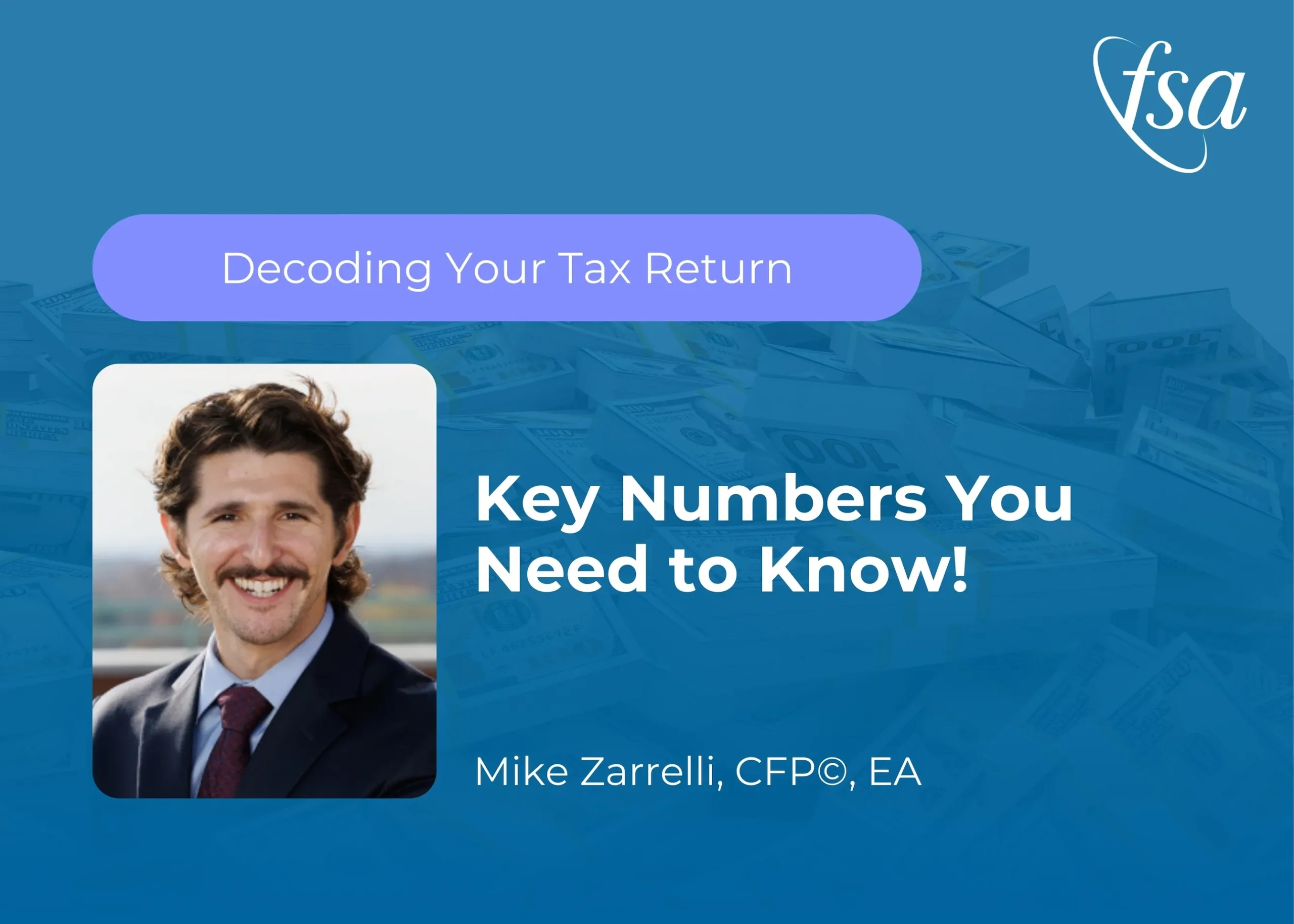By Jim Joseph, CFP®
As 2024 approaches, many of our clients are asking about year-end tax planning. While tax efficiency is important, at FSA we believe it’s just one piece of your complete financial picture. Let’s walk through some practical strategies that can help you preserve and grow your wealth while keeping your broader financial goals in focus.
The Changing Tax Landscape
If you live in the Maryland, D.C., or Virginia area, you’re probably well aware that tax planning has become increasingly complex. Recent market volatility, evolving tax legislation, and the unique challenges of our region’s multi-state employment landscape have created both opportunities and potential pitfalls. For instance, many of our clients who work in D.C. but live in Maryland face unique tax coordination challenges that require careful planning.
Building Your Tax Strategy: Where to Begin
Think of tax planning like building a house; you need a solid foundation before adding the detailed finishing touches. For most of our clients, that foundation starts with optimizing retirement contributions and understanding their complete compensation picture.
Take retirement accounts, for example. While maximizing your 401(k) contributions might seem straightforward, timing these contributions strategically throughout the year can make a significant difference. We often see clients rush to maximize contributions in December, when a more measured approach throughout the year could better align with their cash flow needs and investment strategy.
Health savings accounts (HSAs) present another often-overlooked opportunity. These accounts offer what we call the “triple tax advantage”—tax-deductible contributions, tax-free growth, and tax-free withdrawals for qualified medical expenses. Think of an HSA as a stealth retirement account; you can pay current medical expenses out of pocket while letting your HSA investments grow tax-free for future healthcare needs. With healthcare costs continuing to rise in our region, this strategy has become increasingly valuable for our clients.
Strategic Giving: Making Generosity Work Smarter
Charitable giving represents more than just tax deductions—it’s about creating impact while being financially efficient. One strategy we’ve seen work well for many clients is “bunching” contributions. Imagine you typically donate $10,000 annually to your favorite charities. By combining two years’ worth of giving into a single year, you might exceed the standard deduction threshold, maximizing your tax benefit while maintaining your charitable impact.
A donor-advised fund can make this strategy even more effective, allowing you to take the deduction now while spreading out your actual charitable gifts over time. This approach has proven particularly valuable for our clients who have irregular income patterns or who are planning for retirement. We’ve seen this strategy work especially well for federal employees in our area who are approaching retirement and want to maximize their giving impact.
Understanding Market Impact on Tax Planning
In today’s volatile market environment, tax planning takes on added importance. This is where our FSA Safety Net® strategy plays a crucial role. While harvesting tax losses or exercising stock options, it’s essential to stay shielded against market downturns. Our Safety Net® approach helps clients make tax-efficient decisions while keeping their long-term financial stability in focus.
A Real-World Example: Making it Work
Consider Sarah, one of our clients who recently faced these challenges. As a tech executive in the D.C. metro area, her compensation included RSUs, stock options, and a significant year-end bonus. She also split her time between offices in Maryland and Virginia, adding another layer of tax complexity.
Working together, we developed a comprehensive strategy that considered her entire financial picture. We coordinated her RSU vesting schedule with her other income sources, implemented a strategic exercise plan for her stock options, and used the FSA Safety Net® strategy to help safeguard her positions during market volatility.
The results were significant: Sarah optimized her tax situation while maintaining flexibility for her long-term goals, including a planned retirement home purchase in Delaware. Her story highlights why we emphasize looking at the complete financial picture rather than just focusing on taxes.
Your 2024 Year-End Planning Checklist
As year-end approaches, focus on these key areas:
✓ Review your year-to-date income and projected tax situation.
✓ Evaluate charitable giving opportunities and timing.
✓ Consider accelerating deductions or deferring income.
✓ Maximize retirement account contributions.
✓ Review estimated tax payments and withholding.
✓ Schedule a year-end planning meeting with FSA.
✓ Coordinate with your tax professional.
✓ Review state tax obligations, especially if you work across state lines.
Market Considerations for 2024
Looking ahead to 2024, several factors make tax planning particularly important:
- Potential changes in federal tax policy
- Continued market volatility requiring careful investment timing
- State-level tax changes affecting our D.C. metro region
- Evolving remote work policies impacting state tax obligations
The Path Forward
Every client’s situation is unique, and there’s no one-size-fits-all approach to tax planning. That’s why we take the time to understand your complete financial picture, including your goals, concerns, and opportunities. Our team coordinates with your tax professional to develop strategies that align with your broader financial objectives while taking advantage of current tax-saving opportunities.
Taking Action
Now is the ideal time to review your tax situation so you’re positioned for success in 2025. Whether you’re managing equity compensation, planning for retirement, or simply looking to optimize your tax efficiency, we at Financial Services Advisory (FSA) are here to help you navigate these decisions.
Let’s work together to create a tax strategy that supports your long-term financial goals. To schedule your year-end planning review and feel confident you’re making the most of available opportunities, call (301) 949-7300 or email [email protected].
About Jim
James Joseph, CFP®, is the President of FSA, a financial services firm in Rockville, MD, with over 40 years of experience helping individuals, families, and business owners navigate the complexities of wealth management. Since 2004, Jim has been passionate about guiding clients with personalized financial and investment advice, simplifying complex financial topics, and providing tailored solutions—especially for those approaching or enjoying retirement.
Jim takes pride in the FSA Safety Net®, a unique strategy designed to help clients avoid major losses during market downturns. His belief that “you win by not losing” underscores FSA’s proactive approach to preserving wealth while still seeking growth. By focusing on risk management and using the FSA Safety Net®, Jim works to prevent small losses from becoming significant setbacks, keeping his clients’ goals intact. Specializing in managing 401(k) plans through Pontera, Jim emphasizes the importance of both active management and comprehensive financial planning.
Jim began his financial career in 1997, gaining experience at Charles Schwab and Morgan Stanley, where he crafted retirement strategies and managed portfolios. His extensive background, combined with his genuine dedication to helping clients reach their financial goals, has made him a trusted advisor. He particularly enjoys seeing clients succeed when they embrace his advice and transition smoothly into retirement, believing that starting early and leveraging the power of compounding can unlock future financial flexibility.
Jim holds a bachelor’s degree in Finance from West Virginia University, the CERTIFIED FINANCIAL PLANNER® designation, and over the years has shared his financial knowledge in publications such as The Wall Street Journal and Reader’s Digest. When not at work, Jim enjoys spending time with his three daughters, playing ice hockey, and cheering on his beloved Pittsburgh Penguins and Steelers. He’s also into aviation, working towards his private pilot’s license. To learn more about Jim, connect with him on LinkedIn.
Remember: FSA does not provide tax or legal advice. Please consult your tax and legal advisors regarding your personal circumstances. The FSA Safety Net® is a registered trademark of Financial Services Advisory.
FSA’s current written Disclosure Brochure and Privacy Notice discussing our current advisory services and fees is also available at https://fsawealthpartners.com/disclosures/ or by calling 301-949-7300.




